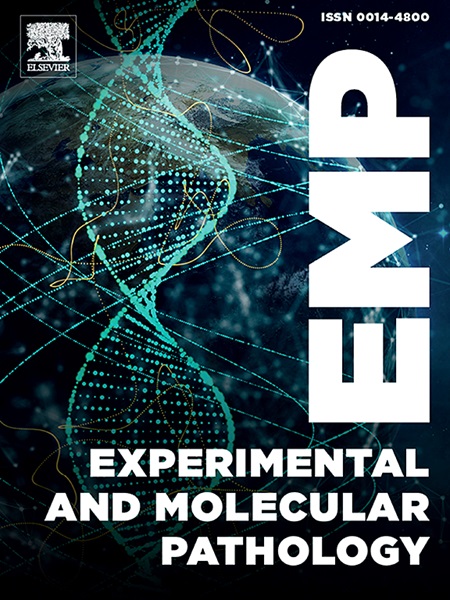Mediterranean diet improves liver health but does not protect against azoxymethane-induced colon tumorigenesis compared to Western diet in A/J mice
IF 3.7
4区 医学
Q2 PATHOLOGY
引用次数: 0
Abstract
Introduction
Abundant evidence indicates that the Mediterranean (MED) diet pattern is beneficial for health, especially cardiovascular health. Epidemiological evidence indicates that the MED diet also affords protection against colorectal cancer (CRC). To date, preclinical models have only evaluated specific MED diet components and therefore, although supportive, fall short of confirming the chemoprotective capacity of this complex dietary pattern. We sought to address this gap.
Method
A/J mice were randomized to receive Western (WRN) or MED diets differing in their fat, protein, and carbohydrate sources. Azoxymethane (AOM) was used to initiate colon tumorigenesis and mice were maintained for 19 weeks after the final dose.
Result
Unexpectedly high mortality was observed amongst male mice following the second AOM dose. At the end of the study hepatic Cyp2E1, an enzyme that metabolize AOM, was lower in males than females. Livers from MED diet mice were significantly lighter, had lower histologic Non-Alcoholic Fatty Liver Disease (NAFLD) scores, and contained less triglycerides than WRN mice. Amongst females, serum alanine transaminase (ALT) was also lower in MED than WRN mice. Amongst male mice, those fed MED diet presented with significantly more colonic tumors than those on the WRN diet.
Conclusion
In this study male mice displayed elevated sensitivity to AOM-induced hepatotoxicity and mortality than females. In agreement with human and preclinical data, livers of MED-diet-fed mice were healthier than those fed WRN diets. We could not confirm the chemoprotective capacity of the MED diet. Additional studies are required to evaluate the purported anticancer effect of the MED diet.
与西方饮食相比,地中海饮食可改善A/J小鼠的肝脏健康,但不能防止偶氮甲烷诱导的结肠肿瘤发生
大量证据表明,地中海(MED)饮食模式有益于健康,尤其是心血管健康。流行病学证据表明,MED饮食还可以预防结直肠癌(CRC)。迄今为止,临床前模型仅评估了特定的MED饮食成分,因此,尽管具有支持作用,但无法证实这种复杂饮食模式的化学保护能力。我们试图解决这一差距。方法将da /J小鼠随机分为脂肪、蛋白质和碳水化合物来源不同的Western (WRN)或MED饮食。偶氮氧甲烷(AOM)用于启动结肠肿瘤发生,并在末次剂量后维持小鼠19周。结果第二剂量AOM后,雄鼠死亡率高。在研究结束时,肝脏Cyp2E1(一种代谢AOM的酶)在男性中的含量低于女性。与WRN小鼠相比,MED饮食小鼠的肝脏明显更轻,组织学非酒精性脂肪性肝病(NAFLD)评分更低,甘油三酯含量更低。在雌性小鼠中,MED小鼠的血清丙氨酸转氨酶(ALT)也低于WRN小鼠。在雄性小鼠中,饲喂MED饮食的小鼠结肠肿瘤明显多于饲喂WRN饮食的小鼠。结论雄性小鼠对aom肝毒性的敏感性和死亡率均高于雌性小鼠。与人类和临床前数据一致,以med饮食喂养的小鼠的肝脏比以WRN饮食喂养的小鼠更健康。我们无法证实MED饮食的化学保护能力。需要更多的研究来评估所谓的MED饮食的抗癌效果。
本文章由计算机程序翻译,如有差异,请以英文原文为准。
求助全文
约1分钟内获得全文
求助全文
来源期刊
CiteScore
8.90
自引率
0.00%
发文量
78
审稿时长
11.5 weeks
期刊介绍:
Under new editorial leadership, Experimental and Molecular Pathology presents original articles on disease processes in relation to structural and biochemical alterations in mammalian tissues and fluids and on the application of newer techniques of molecular biology to problems of pathology in humans and other animals. The journal also publishes selected interpretive synthesis reviews by bench level investigators working at the "cutting edge" of contemporary research in pathology. In addition, special thematic issues present original research reports that unravel some of Nature''s most jealously guarded secrets on the pathologic basis of disease.
Research Areas include: Stem cells; Neoangiogenesis; Molecular diagnostics; Polymerase chain reaction; In situ hybridization; DNA sequencing; Cell receptors; Carcinogenesis; Pathobiology of neoplasia; Complex infectious diseases; Transplantation; Cytokines; Flow cytomeric analysis; Inflammation; Cellular injury; Immunology and hypersensitivity; Athersclerosis.

 求助内容:
求助内容: 应助结果提醒方式:
应助结果提醒方式:


